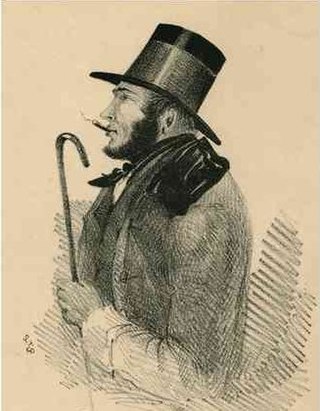Related Research Articles

Boyle Travers Finniss was the first premier of South Australia, serving from 24 October 1856 to 20 August 1857.

Richard Bullock Andrews was an Australian politician and judge.

Simpson Newland CMG, pastoralist, author and politician, was a pioneer in Australia who made significant contributions to development around the Murray River. He was also an author of practical works and novels.

Sir John Morphett was a South Australian pioneer, landowner and politician. His younger brother George Morphett was also an early settler in South Australia.

Robert Cock was one of the first European explorers of the Adelaide region of South Australia following the establishment of the colony in December 1836.
This is a list of related persons who have held positions in the two South Australian houses of parliament or represented South Australia in Canberra. It includes some notes on people with identical surnames but no clear family connection.
Edward John Peake was a winemaker, auctioneer, land agent, magistrate Member of Parliament and a prominent member of the Catholic Church in the early days of South Australia. born in Gloucestershire.

John Dunn Sr. was a flour miller in the early days of the colony of South Australia; a parliamentarian, philanthropist and a prominent citizen of Mount Barker, South Australia.
David Shannon served one term as a member of the South Australian House of Assembly for the Electoral district of Light from 9 September 1858 to 18 March 1860.

William Bakewell was a solicitor and politician in the early days of the Colony of South Australia.
Thomas Atkinson was a pioneer farmer in the Willunga, South Australia and for nine years was a representative for that district in Parliament. In later life he was frequently referred to as "Captain Atkinson".
Arthur Fydell Lindsay was a politician in the early days of the colony of South Australia.

George Morphett was a settler in the colony of South Australia, and younger brother of John Morphett.
David Wark was a medical practitioner and politician in the colony of South Australia. He was at the centre of a controversy after being called to examine a child suspected of having been murdered.
Alexander Anderson was a politician and hotelier in the young colony of South Australia.

John Hallett was a businessman, pastoralist and politician in the early days of the Colony of South Australia who was implicated in the massacre of Aborigines at Mount Bryan, South Australia in the 1840s.
John Rowe was a mineral assayer and mine manager who had a brief spell as member of South Australian parliament.
Charles Henry Hussey was a politician in colonial South Australia.
South Australian Morphett families include the children of Nathaniel Morphett and Mary Morphett :
Lieutenant George Frederick Dashwood RN, frequently referred to as "Captain Dashwood", was a naval officer, public servant and politician in South Australia. He was appointed an acting member of the Legislative Council of South Australia, serving from June 1843 to June 1844.
References
- 1 2 "The Late Mr. R. F. Newland". South Australian Register . 23 September 1873. p. 5. Retrieved 16 November 2016– via Trove.
- ↑ "Advertising". South Australian Register . 10 February 1849. p. 2. Retrieved 15 November 2016– via Trove.
- ↑ "News from England – Wool Sales". South Australian Gazette and Mining Journal South Australian Gazette and Colonial Register . 31 October 1846. p. 2. Retrieved 15 November 2016– via Trove.
- ↑ i.e. was not a member by virtue of holding an official Government position, in modern parlance "without portfolio"
- ↑ "Richard Francis Newland". Former members of the Parliament of South Australia . Retrieved 5 December 2022.
- ↑ "Mr R. F. Newland". The South Australian Advertiser . 3 November 1860. p. 3. Retrieved 16 November 2016– via Trove.
- ↑ "Government Emigration to Australia". South Australian Weekly Chronicle . 13 December 1862. p. 6. Retrieved 16 November 2016– via Trove.
- ↑ "Proceedings in Parliament". The South Australian Advertiser . 17 September 1863. p. 2. Retrieved 16 November 2016– via Trove.
- ↑ "South Australian Banking Company". The South Australian . 27 October 1848. p. 2. Retrieved 15 November 2016– via Trove.
- ↑ "Destitute Board". Adelaide Observer . 18 February 1860. p. 3. Retrieved 16 November 2016– via Trove.
- ↑ "Journal of Expeditions in Central and Southern Australia". The South Australian . 24 February 1846. p. 3. Retrieved 15 November 2016– via Trove.
- ↑ "Family Notices". South Australian Register . 24 December 1842. p. 2. Retrieved 15 November 2016– via Trove. Eleanor and Jane Frome (c. 1814– ), wife of Edward Charles Frome, were 4th and 2nd daughters respectively of Colonel Alexander Whalley Light, late of the 25th Regt (their eldest sister married Herbert F. Hore, the 3rd married Peter Boyle de Blaquière and the 5th the Hon. George Alexander). Eleanor and the Frome family arrived in South Australia aboard Recovery in September 1839. Colonel Alexander Whalley Light and Colonel William Light were not related..
- ↑ "Advertising". The South Australian . 24 October 1848. p. 3. Retrieved 16 November 2016– via Trove.